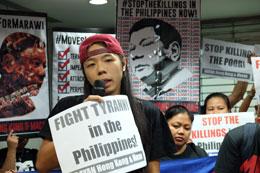Critics fear Duterte’s “rising tyranny”

Philippine President Rodrigo Duterte, elected on a firebrand populist ticket, is threatening to install a full-fledged authoritarian regime in response to rising criticism of his policies, including a lethal drug war that has cost thousands of lives, according to a report in Asia Times.
“Once your destabilization is already creating chaos, I will not hesitate to declare a revolutionary government until the end of my term,” Duterte recently warned his critics.
Rather than declaring martial law nationwide, a rights-curbing move many feared he might impose in response to the Islamic State siege on the southern city of Marawi, Duterte has instead upped the ante by proposing to suspend the entire constitution.
Duterte has repeatedly claimed that a conspiratorial cabal of oligarchs, drug syndicates and liberal elites are sabotaging his policies and bent on overthrowing his popularly elected government, Asia Times said.
A so-called revolutionary government would pave the way for a new regime that, Duterte and his supporters contend, would overhaul the country’s broken politics that have long been ravaged by corruption, ineffectual leadership and outsized family dynasties.
Typically, the tough-talking leader and his top lieutenants later downplayed and disowned the threat. But it’s increasingly clear that Duterte’s move towards authoritarianism is intensifying with the country’s political polarization.
Among the proposals is installment of an Internal Security Act (ISA) — similar to authoritarian Malaysia and Singapore — to allow government authorities to more expeditiously crack down on perceived enemies of the state.
“The use of revolutionary government branding in order to support his own coup is a mockery of the revolution itself,” declared Kabataan Partylist, a coalition of left-leaning activists tied to the Philippine communist movement.
Other critics dismissed the revolutionary government proposal as blatant “lust for wealth and power of the pro-Duterte clique of the ruling elite.”
To justify the controversial proposal, Duterte claimed that the late president and democratic icon Corazon “Cory” Aquino made a similar move in the immediate aftermath of the Marcos dictatorship’s downfall.
He failed, however, to mention that Aquino took power after the 1986 “People Power Revolution” and shortly thereafter installed a democratic constitution.
The Filipino president’s alliance with the Marcos family, and his constant praise of the former disgraced dictator, has only reinforced fears that he is intent on regime change that ends the country’s hard-earned democracy.
Duterte has warned the political opposition that he “will arrest all of you,” and won’t hesitate to launch a “full-scale war against the [communists]” amid the recent breakdown in peace negotiations with the insurgent group.
Like Marcos, Duterte has effectively declared war on both the communists and the liberal opposition.
Still, the president’s biggest obstacle to establishing a new regime is the powerful military, which he doesn’t fully control. If anything, the Philippine security establishment has emerged as the unlikely guardian of the country’s democratic order.
“Both [Lorenzana and Guerrero] assured us in no uncertain terms that they would not support a revolutionary government and any other threat to the constitution,” Robredo claimed in an interview in early November. “[w]e were assured – and the assurance was strong – that they would not support such a plan.”
The military and defense sector’s unambiguous opposition may thus explain Duterte’s dithering and contradictory stance on the issue.
Yet it’s far from clear for how long the Philippine military and democratic forces in the country can constrain Duterte’s clearly articulated authoritarian ambitions in what is becoming the country’s most uncertain political era in recent memory, Asia Times said.









